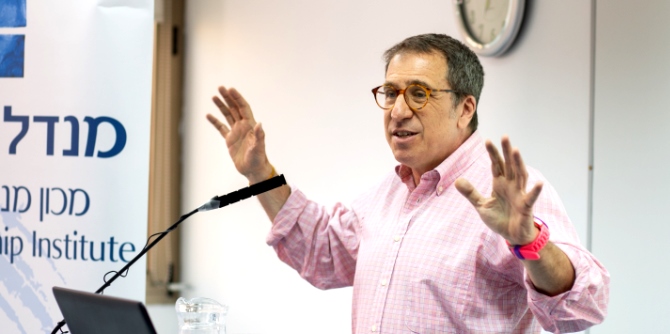Nigel Savage, the founder and director of Hazon: The Jewish Lab for Sustainability, explored the power of Jewish identity and the Jewish community to respond to the prospect of climate crisis, in a lecture hosted by the Mandel Program for Leadership in Jewish Culture.
“Jewish history is full of creative responses to the most desperate crises, from Noah and the Flood through to the 20th century," said
Mishael Zion, the director of the Mandel Program for Leadership in Jewish Culture, in his introduction to the lecture, held on May 26 at the Mandel Leadership Institute. "When it comes to the climate crisis, our program asks: How can we use Jewish culture as a resource to cope with the challenges and crises that are now at our door? Nigel is someone who knows how to ask big questions and believes that they can be answered creatively, no matter how large the challenge. We have asked him to sum up his 20 years of activism on climate change in the Jewish community, and to share with us insights from this act of leadership.”

In his lecture, Nigel Savage — a prominent figure in climate change discourse in the international Jewish community — presented the goal of his nonprofit organization: “Hazon seeks to improve environmental quality in the world as a whole by changing the discourse within the Jewish community,” he said. Savage surveyed the unique challenges involved in changing practices and discourse with regard to the climate crisis: “It’s difficult for us to cope with global warming because as people, we need a clear definition of success and failure, and because we want to feel we are on the side of good as opposed to other, 'bad' forces. On this issue, however, there are no good guys and no bad guys. We have all grown up in a way that is simply not sustainable.”
“I want to focus on an act of leadership that each of us can perform, beyond examining our personal consumption and habits. Not just on the things that every state can do, but on leveraging the power that we have over intermediate organizations,” Savage said. He emphasized that “significant change can come via the impact of individuals on the organizations and communities of which they are members. It is easier to change organizations and communities than it is to change governments because they are smaller, but these organizations also have influential power that can affect government policy. Setting up organizational ‘green teams’ is critical for achieving meaningful change.”
Savage also highlighted our dietary habits as a lever for change. “Throughout most of human history, people ate meat and milk, but never on the industrial scale and daily basis seen today. The most effective, convenient, and significant way to ease the burden on the climate is to reduce our consumption of these products, not only on the level of the family but also on a communal and organizational level” he said. “The Jewish community is blessed with a number of central institutions that have always been essential to it; now, we can change the consumption patterns of these Jewish institutions, and thus of the Jewish people and, ultimately, the entire world.”
In conclusion, Savage quoted Rabbi Jonathan Sacks, the former chief rabbi of Britain: “Optimism is the belief that the world is changing for the better. Hope is the belief that we can change it for the better.”
